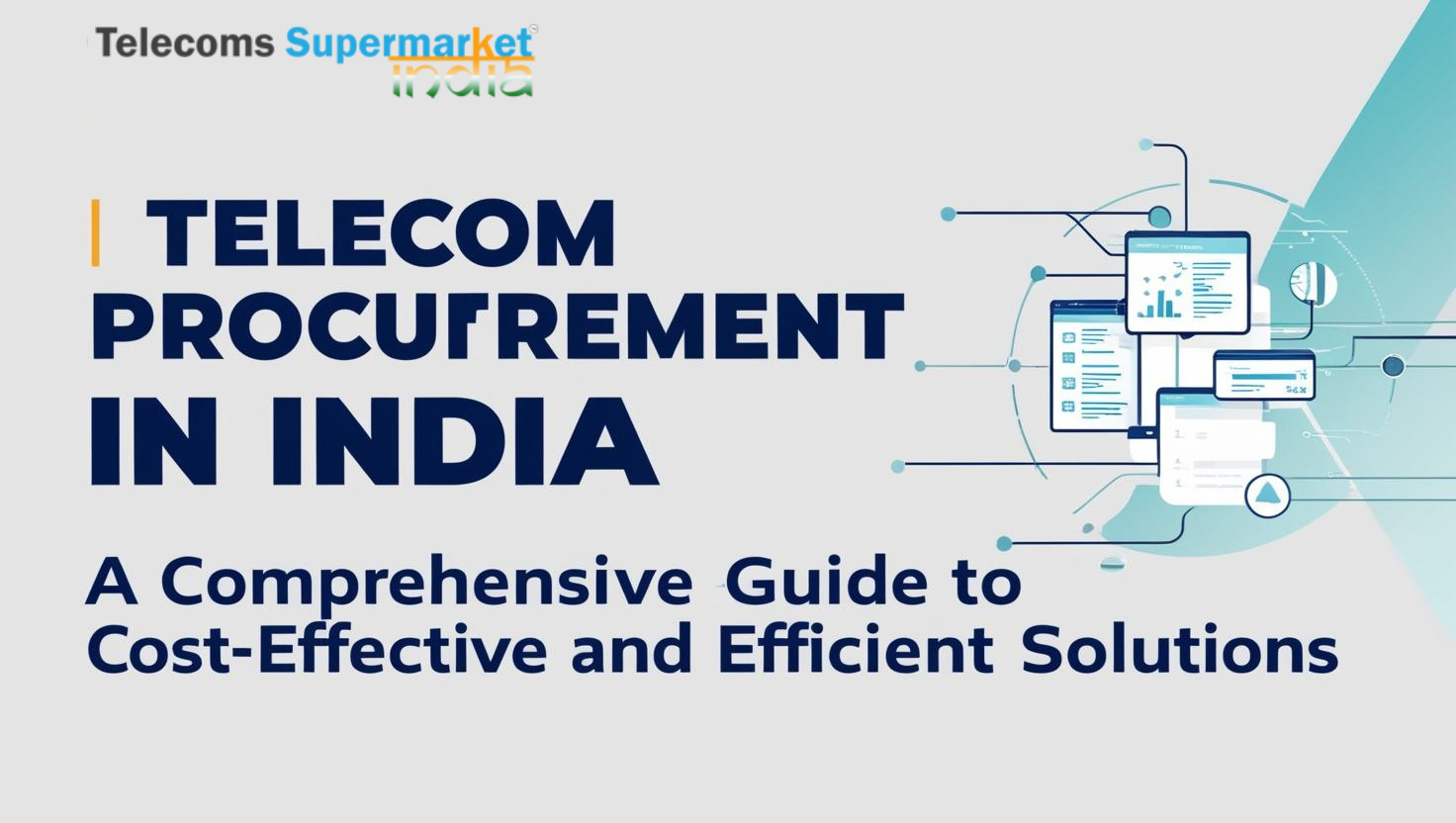Discover the best strategies for telecom procurement in India with our comprehensive guide. Compare service providers, optimize costs, and ensure reliable connectivity for your business.
In today's digital era, telecom services are crucial in business operations, government infrastructure, and consumer communications. Efficient telecom procurement in India has become essential for organizations to ensure they receive the best connectivity solutions at competitive prices. However, navigating the telecom procurement landscape can be challenging with multiple service providers, diverse pricing models, and varying service quality.This guide aims to provide a deep understanding of telecom procurement in India, highlighting key challenges, best practices, and strategies for selecting the most cost-effective and efficient telecom solutions.

Understanding Telecom Procurement
Telecom procurement involves acquiring telecommunications services such as internet connectivity, mobile communication, VoIP solutions, leased lines, cloud telephony, and enterprise solutions like EPABX and IVR. To achieve optimal results, businesses and organizations must analyze their requirements, compare service providers, negotiate contracts, and ensure seamless implementation.
Key Challenges in Telecom Procurement in India
1. Diverse and Complex Offerings
The telecom industry in India is vast, with numerous providers offering a wide range of services. Understanding which service best fits an organization's needs can be overwhelming due to varying pricing and contract terms.
2. Cost Variability
Due to regulatory changes, competition, and hidden charges, telecom service costs fluctuate. Organizations often struggle to identify transparent and fair pricing for the services they need.
3. Service Quality and Reliability
Service quality can vary significantly across providers and regions. Ensuring high uptime, minimal latency, and good customer support is crucial but often difficult to evaluate before procurement.
4. Regulatory Compliance
The Indian telecom sector is governed by regulations set by TRAI (Telecom Regulatory Authority of India). Companies must ensure compliance with data security laws, telecom licenses, and other industry-specific regulations.
5. Vendor Lock-in and Long-Term Contracts
Many telecom providers enforce long-term contracts with strict termination clauses. Businesses must negotiate contracts wisely to avoid vendor lock-in and ensure flexibility.
Best Practices for Efficient Telecom Procurement
1. Assessing Business Needs
Before initiating the procurement process, businesses should internally audit their telecom requirements. This includes evaluating current usage, identifying future scalability needs, and understanding pain points with existing providers.
2. Comparing Service Providers
Businesses can use online platforms like Telecoms Supermarket India to compare telecom services, pricing, and customer reviews to make informed decisions. Vendor comparison ensures organizations get the best value for their investment.
3. Negotiating Contracts and SLAs
When procuring telecom services, negotiation is key. Businesses should focus on:
- Clear pricing structures
- Service Level Agreements (SLAs) ensure uptime and response times
- Contract flexibility and termination policies
- Additional costs for installation, maintenance, and upgrades
4. Leveraging Bulk Purchasing
Organizations with high telecom needs can purchase in bulk for better discounts and customized service plans. Partnering with telecom aggregators can also help secure cost-effective deals.
5. Ensuring Redundancy and Backup Solutions
Downtime can significantly impact business operations. Ensuring redundancy through multiple providers, backup internet connections, and failover solutions is crucial for seamless connectivity.
6. Emphasizing Cybersecurity and Compliance
With the rise of cyber threats, businesses must ensure that telecom providers follow stringent security protocols. This includes data encryption, firewall protection, and adherence to compliance regulations such as GDPR and IT Act 2000.
Trends in Telecom Procurement in India
1. 5G Adoption and Digital Transformation
With the rollout of 5G technology, businesses are upgrading their telecom infrastructure to leverage high-speed connectivity, IoT applications, and AI-driven communications.
2. Cloud-Based Telecom Solutions
Cloud telephony and VoIP solutions are becoming increasingly popular as businesses seek scalable and cost-effective alternatives to traditional telecom systems.
3. AI and Automation in Procurement
AI-driven tools are streamlining telecom procurement by analyzing data patterns, predicting service reliability, and automating vendor selection processes.
4. Green and Sustainable Telecom Solutions
Organizations are moving towards eco-friendly telecom solutions, such as energy-efficient network infrastructure and sustainable procurement policies.
How Telecoms Supermarket India Simplifies Telecom Procurement
As India's leading telecom comparison and procurement platform, Telecoms Supermarket India offers businesses a seamless way to compare, analyze, and purchase telecom services. Key benefits include:
- Transparency: Clear pricing and feature comparison
- Ease of Use: A simple interface for quick decision-making
- Expert Assistance: Consultation services to guide businesses in selecting the right telecom solutions
- Cost Savings: Competitive pricing with special offers and discounts
Conclusion
Telecom procurement in India is a strategic process that requires careful analysis of service providers, pricing models, regulatory compliance, and technological advancements. By following best practices and leveraging platforms like Telecoms Supermarket India, businesses can optimize their telecom expenses while ensuring top-notch connectivity and service quality.Whether you're a startup, SME, or enterprise, investing in the right telecom solutions can significantly impact productivity, efficiency, and overall business success. Stay ahead in the telecom game by making informed procurement decisions today!


